Related Research Articles

The Mutual Broadcasting System was an American commercial radio network in operation from 1934 to 1999. In the golden age of U.S. radio drama, Mutual was best known as the original network home of The Lone Ranger and The Adventures of Superman and as the long-time radio residence of The Shadow. For many years, it was a national broadcaster for Major League Baseball, the National Football League, and Notre Dame Fighting Irish football. From the mid-1930s and until the retirement of the network in 1999, Mutual ran a highly respected news service accompanied by a variety of popular commentary shows. Mutual pioneered the nationwide late night call-in radio program in the late 1970s, introducing the country to Larry King and later Jim Bohannon.
The year 1942 saw a number of significant happenings in radio broadcasting history.
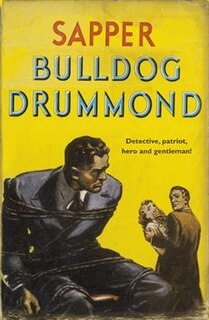
Hugh "Bulldog" Drummond is a fictional character, created by H. C. McNeile and published under his pen name "Sapper". Following McNeile's death in 1937, the novels were continued by Gerard Fairlie. Drummond is a First World War veteran who, fed up with his sedate lifestyle, advertises looking for excitement, and becomes a gentleman adventurer. The character has appeared in novels, short stories, on the stage, in films, on radio and television, and in graphic novels.
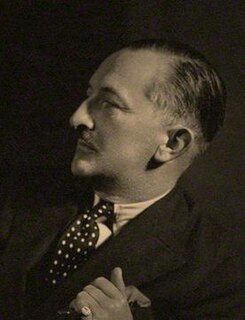
Herman Cyril McNeile, MC, commonly known as Cyril McNeile and publishing under the name H. C. McNeile or the pseudonym Sapper, was a British soldier and author. Drawing on his experiences in the trenches during the First World War, he started writing short stories and getting them published in the Daily Mail. As serving officers in the British Army were not permitted to publish under their own names, he was given the pen name "Sapper" by Lord Northcliffe, the owner of the Daily Mail; the nickname was based on that of his corps, the Royal Engineers.
The year 1954 saw a number of significant happenings in radio broadcasting history.
The year 1941 saw a number of significant happenings in radio broadcasting history.
The year 1938 saw a number of significant events in radio broadcasting.
The Ted Steele Show is the title of several television and radio programs that were hosted by bandleader Ted Steele (1917–1985).

Bulldog Drummond at Bay was the ninth Bulldog Drummond novel. It was published in 1935 and written by H. C. McNeile under the pen name Sapper. It was filmed in 1937 and in 1947.

Challenge was the tenth and final Bulldog Drummond novel written by H. C. McNeile. It was published in 1935 under McNeile's pen name Sapper.

Bulldog Drummond Strikes Back is a 1947 American adventure crime mystery film directed by Frank McDonald and starring Ron Randell, Gloria Henry and Patrick O'Moore. The film is loosely based on the H. C. McNeile novel Knock-Out.

Don Carney was the stage name of Howard Rice, an American radio personality and children's radio show host. Carney was best remembered as the host of Uncle Don, a children's radio program produced between 1928 and 1947 and broadcast from WOR in New York.
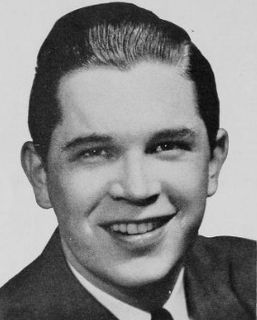
Ted Steele was an American bandleader and host of several radio and television programs. He also held administrative positions at radio stations and had his own media-related businesses.

Ned Wever was an actor on stage and on old-time radio. Garyn G. Roberts wrote in his book, Dick Tracy and American Culture: Morality and Mythology, Text and Context, "Wever's most famous role was probably that of H.C. McNeile's British detective and adventurer Bulldog Drummond for the program of the same name."
The Black Castle is an old-time radio mystery-terror program in the United States. The 15-minute program was broadcast on Mutual in 1943 and 1944.
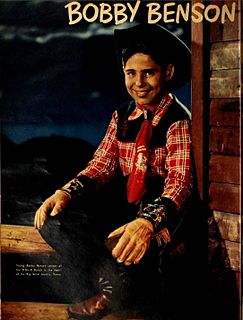
Bobby Benson and the B-Bar-B Riders is an old-time radio juvenile Western adventure program in the United States, one of the first juvenile radio programs. It was broadcast on CBS October 17, 1932 - December 11, 1936, and on Mutual June 21, 1949 - June 17, 1955.
Brownstone Theater is an old-time radio dramatic anthology series in the United States. It was broadcast on the Mutual Broadcasting System February 21, 1945 – September 23, 1945.

Chick Carter, Boy Detective is a 15-minute American old-time radio juvenile crime drama. It was carried on the Mutual Broadcasting System weekday afternoons from July 5, 1943 to July 6, 1945.
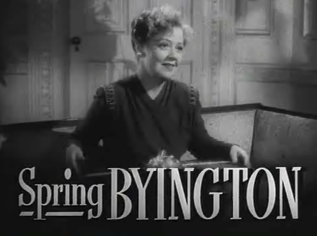
December Bride is an American old-time radio situation comedy. It was broadcast on CBS from June 8, 1952, to September 6, 1953, replacing Jack Benny's program. CBS television broadcast a version of the program 1954–1959.
Hashknife Hartley is an American old-time radio Western program. It was broadcast on the Mutual Broadcasting System from July 2, 1950, until December 30, 1951.
References
- 1 2 3 4 5 Dunning, John (1998). On the Air: The Encyclopedia of Old-Time Radio (Revised ed.). New York, NY: Oxford University Press. p. 123. ISBN 978-0-19-507678-3 . Retrieved 2019-09-22.
- ↑ Roberts, Garyn G. (1993). Dick Tracy and American Culture: Morality and Mythology, Text and Context. McFarland. p. 231. ISBN 9780786416981 . Retrieved 14 September 2016.
- 1 2 Reinehr, Robert C. and Swartz, Jon D. (2008). The A to Z of Old-Time Radio. Scarecrow Press, Inc. ISBN 978-0-8108-7616-3. pp. 49–50.
- 1 2 Terrace, Vincent (1981), Radio's Golden Years: The Encyclopedia of Radio Programs 1930–1960. A.S. Barnes & Company, Inc. ISBN 0-498-02393-1. p. 5.
- 1 2 3 Dunning, John. (1976). Tune in Yesterday: The Ultimate Encyclopedia of Old-Time Radio, 1925–1976. Prentice-Hall, Inc. ISBN 0-13-932616-2. p. 102.
- ↑ Alicoate, Jack, Ed. (1947). Radio Daily presents the 1947–48 Edition of Shows of Tomorrow. Radio Daily Corp. p. 37. "The Adventures of Bulldog Drummond" (PDF). Retrieved 13 February 2015.
- ↑ Crosby, John (January 2011). "Air Villains Chased Again By 'Mr. X'" (PDF) (53). Old-Time Radio Researchers. The Old Radio Times. pp. 7–12. Retrieved 14 February 2015.
- ↑ Balk, Alfred (2006). The Rise of Radio, from Marconi through the Golden Age. McFarland & Company, Inc. ISBN 978-0-7864-2368-2. p. 173.
- 1 2 3 Buxton, Frank and Owen, Bill (1972). The Big Broadcast: 1920–1950. The Viking Press. ISBN 9780810829572. p. 42.
- 1 2 DeForest, Tim (2008). Radio by the Book: Adaptations of Literature and Fiction on the Airwaves. McFarland & Company, Inc. ISBN 978-0-7864-3972-0. pp. 36–40.
- ↑ "Mercedes McCambridge: Radio star shows her versatility". Life. September 23, 1946. p. 55. Retrieved 15 February 2015.
- ↑ "Main Street" (PDF). Radio Daily. March 2, 1945. p. 4. Retrieved 15 February 2015.
- ↑ "O'Cedar" (PDF). Broadcasting. October 22, 1945. p. 65. Retrieved 15 February 2015.[ permanent dead link ]
- ↑ "CKLW Solving War Shifts With A.M. Gaff". Billboard. February 27, 1943. p. 6. Retrieved 15 February 2015.
- ↑ "Bulldog Drummond On E.T. Next Month". Billboard. December 30, 1947. p. 10. Retrieved 15 February 2015.
- ↑ "(WOR ad)". Billboard. February 28, 1948. p. 9. Retrieved 15 February 2015.
- ↑ "MBS Sales up Nearly 10% in '53" (PDF). Broadcasting. January 4, 1954. p. 68. Retrieved 16 February 2015.[ permanent dead link ]
- ↑ "MBS Sets Lineup for Program Plan" (PDF). Broadcasting. September 28, 1953. p. 73. Retrieved 16 February 2015.[ permanent dead link ]